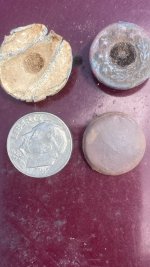Prime
Full Member
I was just reading a post about a treasure legend that involved burial sites, and buried valuables, and as I was reading it, I started pondering the ethics of anyone disturbing a grave site. I come from a background where even stepping on a grave site was a big no-no. This was out of a solemn respect for those who have died. The very idea of desecrating a grave was not even something that could enter one's head. It was unthinkable.
Therefore, I personally have a moral objection to digging up a burial site. I wouldn't want to think of myself as a grave robber either. But then, what's the difference between a Treasure Hunter removing valuables from an old burial site, vs an archaeologist doing the same thing? They go one step further and also remove the body and put it up on display.....isn't that much worse? Aren't archaeologists who dig up remains and take all the loot just glorified grave robbers? Sure, they don't keep all the loot, but they get paid to dig it up. The end results are the same, just for different reasons. So is that what this comes down to, "motives"?
Then again, dead people won't do anything with the treasure, it's still there, they sure as hell haven't taken it "to the other side", but then, where do you draw the line?
Ehh, maybe I'm just old fashioned, or full of crap. I'm also trying to find common ground between my stubborn conscience and the reality of our messed up world. Everything seems to be so relative these days, where the clear lines of days gone by seem to be blurred and everything is up for debate.
There is also the fact that I'm contemplating this from my computer chair, and not 2 feet away from a burial site. So this is just rhetoric at this point.
Prime
Therefore, I personally have a moral objection to digging up a burial site. I wouldn't want to think of myself as a grave robber either. But then, what's the difference between a Treasure Hunter removing valuables from an old burial site, vs an archaeologist doing the same thing? They go one step further and also remove the body and put it up on display.....isn't that much worse? Aren't archaeologists who dig up remains and take all the loot just glorified grave robbers? Sure, they don't keep all the loot, but they get paid to dig it up. The end results are the same, just for different reasons. So is that what this comes down to, "motives"?
Then again, dead people won't do anything with the treasure, it's still there, they sure as hell haven't taken it "to the other side", but then, where do you draw the line?
Ehh, maybe I'm just old fashioned, or full of crap. I'm also trying to find common ground between my stubborn conscience and the reality of our messed up world. Everything seems to be so relative these days, where the clear lines of days gone by seem to be blurred and everything is up for debate.
There is also the fact that I'm contemplating this from my computer chair, and not 2 feet away from a burial site. So this is just rhetoric at this point.
Prime






